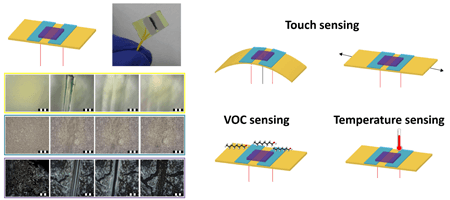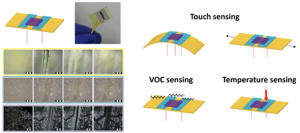Synthetic Polymer Repairs “Electronic Skin”

Researchers from the Israel Institute of Technology in Haifa have developed materials that have the ability to fix its scratches. A a that can be integrated in flexible devices imitates the self-healing properties of human skin, repairing a surface in less than a day. The findings were published in the journal Advanced Materials.
Flexible sensors are used in multiple devices and fields like the space industry, consumer electronics, robotics or health care. With its ability to “feel” changes in the environment, these sensors could act soon as an electronic skin for their users. However, sensors are fragile and can be easily damaged. Searching for a solution to this vulnerability, Dr. Huynh and Dr. Haick have found it in human skin. The researchers developed a polymer that mimics skin self-healing properties. Covering a sensor with the polymer, they developed a flexible chemiresistor that can fix damage or cuts in any part of its surface.
The new sensor contains the self-healing synthetic polymer, electrodes and gold nanoparticles. After damage and healing, the sensor regains volatile organic compounds detection capability. It can heal at very high and very low temperatures, allowing its use in extreme weather conditions, in any part of the world. However, it heals best between 0 and 10 ºC, when moisture condenses and can be absorbed by the sensor; in these conditions, polymers move better and can fix the damages more easily. The sensor passed demanding strain tests.
Sensor resistance increases after healing
A very interesting property of the new e-skin is that it is actually stronger after the healing process. The researchers show that, when healed, it can resist 20 times more cutting/healing cycles than without healing.
Currently, the researchers are working with self-healing carbon-based materials and transistors.
Source: ATS


